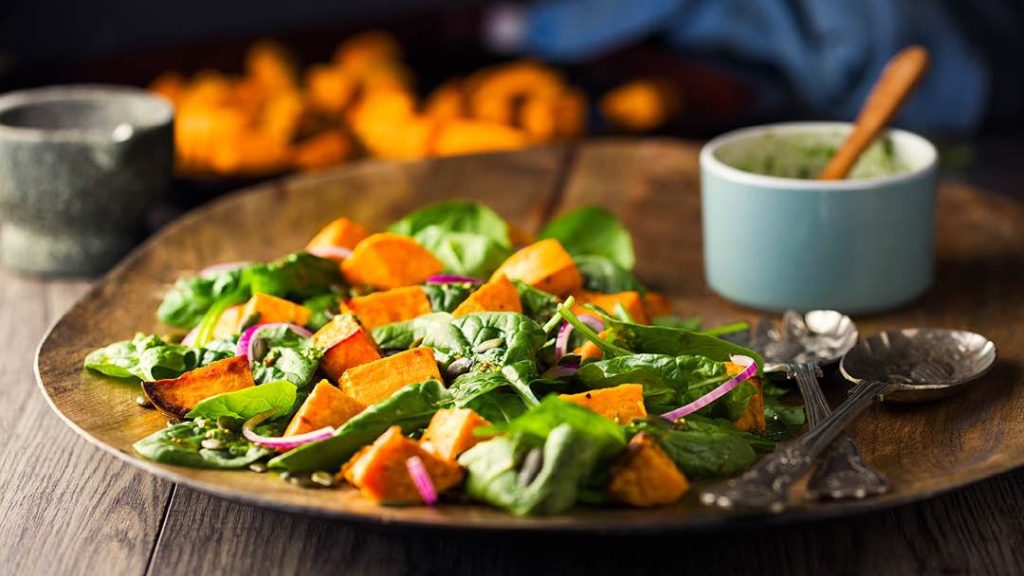-
Infectious Diseases
Fight off the flu with immune-boosting nutrients

It's flu season again, so most people get a flu shot and strive to stay healthy. But can certain foods or supplements boost the immune system and help with that "staying healthy" goal?
Keep the immune system strong
While having a healthy immune system is a plus during the season of colds and flu, consider these tips for keeping your immune system strong throughout the year.
Focus on a balanced eating plan.
Don't skip meals, so your body stays well-fueled. Aim for five to nine servings of vegetables and fruits daily to provide those immune-boosting vitamins, minerals and antioxidants. A serving of fruit is one medium piece of fresh fruit, 1 cup of berries or melon, or 1/2 cup of canned fruit packed in its own juice. A serving of vegetables is 1/2 cup cooked or 1 cup raw. Getting these nutrients from foods versus vitamin or mineral supplements is always best. Many herbal remedies are marketed to help fight colds or shorten their duration, but check with a health care professional before taking any supplements or medications. And don't forget fluids. Remember to drink adequate fluids throughout the day. Plain water is best.
Crack down on spreading germs.
Good hygiene and hand-washing help prevent the spread of germs. Remember to wash produce before eating or using it in recipes. Clean glasses, forks, spoons and other utensils to reduce the spread and growth of bacteria.
Increase sleep, reduce stress.
Getting adequate sleep and managing stress can be just as important as healthy eating to prevent the flu.
Research demonstrates that lack of sleep and increased stress contribute to illness and overall poor health, so:
- Adults should get seven to nine hours of sleep each day, while children need eight to 14 hours, depending on age.
- Healthy ways to cope with stress include meditating, listening to music or journaling.
- Physical activity is another strategy to manage stress and may reduce the risk of some chronic diseases that can weaken your immune system.
Even if you eat healthily, get plenty of rest, drink adequate fluids and manage your stress, you may still catch the flu. If so, your illness may not last as long, and you may not feel so bad.
Here are some myths and facts about immune-boosting nutrients:
Fact: Chicken soup can help you feel better.
According to the National Institutes of Health, there are many healing benefits of chicken soup. Your favorite recipe likely has properties that fight inflammation, promote hydration and get mucus flowing. Drink plenty of liquids, such as water, broth or sports drinks with electrolytes.
Myth: Vitamin C can prevent illness.
When taken before cold symptoms start, vitamin C may shorten the duration, but it doesn't keep you from getting sick.
Myth: Dairy increases mucus production.
You may have heard that milk and other dairy products worsen congestion during an illness. Research has not proven this to be true.
Choose immune-boosting nutrients
These nutrients play a role in immune health:
- Beta carotene
Beta carotene is found in plant foods, such as sweet potatoes, spinach, carrots, mangoes, broccoli and tomatoes. - Vitamin C
Vitamin C-rich foods include citrus fruits, berries, melons, tomatoes, bell peppers and broccoli. - Vitamin D
Vitamin D is found in fatty fish and eggs. Milk and 100% juices fortified with vitamin D also are good sources. - Zinc
Zinc tends to be better absorbed from foods such as beef and seafood, but it's also found in plant-based sources, including wheat germ, beans, nuts and tofu. - Probiotics
Probiotics are good bacteria that promote health. You'll find them in cultured dairy products, such as yogurt, and in fermented foods, such as kefir and kimchi. - Protein
Protein comes from animal and plant sources, including milk, yogurt, eggs, beef, chicken, seafood, nuts, seeds, beans and lentils.
Stay well. In the meantime, here are some recipes incorporating immune-fighting foods:
Chicken noodle soup with dill
Serves 6
10 cups reduced-sodium chicken broth
3 medium carrots, diced
1 large stalk celery, diced
3 tablespoons minced fresh ginger
6 cloves garlic, minced
4 ounces whole-wheat egg noodles (3 cups)
4 cups shredded cooked skinless chicken breast (about 1 pound)
1 tablespoon chopped fresh dill
1 tablespoon lemon juice, or to taste
Bring broth to a boil in a Dutch oven. Add carrots, celery, ginger and garlic; cook uncovered over medium heat until vegetables are just tender, about 20 minutes. Add noodles and chicken; simmer until the noodles are just tender, 8–10 minutes. Stir in dill and lemon juice.
Nutrition per serving (1½ cups): 267 calories, 4 g total fat, 2 g saturated fat, 1 g monounsaturated fat, 0 g cholesterol, 38 g protein, 18 g carbohydrates, 2 g dietary fiber, 330 g sodium.
Tomato apple jam
Mayo Clinic Healthy Living Center
Serves 4
Serve as condiment with chicken steak, fish, fried eggs or toast.
1 tablespoon olive oil
1 cup yellow onions, diced
1 teaspoon ground mustard seed
⅛ teaspoon cayenne pepper
⅛ teaspoon ground allspice
⅛ teaspoon ground cinnamon
2 cups tomatoes, peeled and diced
2 cups apples, unpeeled and diced
¼ cup apple cider vinegar
¼ cup sugar
¾ teaspoon salt (decrease if on sodium restriction)
Heat olive oil in a pan over medium heat. Sautee onions for two minutes. Then add all the spices; toast and stir for two minutes. Add the tomatoes, apples, vinegar and sugar. Mix together and simmer over low heat for 20–30 minutes, stirring occasionally. Season to taste.
Nutrition per serving (2 tablespoons): 24 calories, 0.5 g total fat, 0.1 g saturated fat, 0.3 g monounsaturated fat, 0 g cholesterol, 0.3 g protein, 5 g carbohydrates, 1 g dietary fiber, 48 g sodium.
Kristi Wempen is a dietitian in Nutrition in Mankato, Minnesota.
Related Articles







